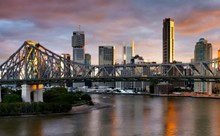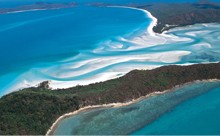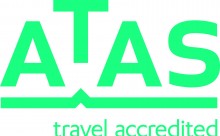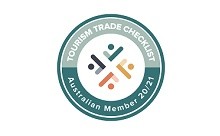MELBOURNE INFORMATION
http://SKYhuboceania.com/melbourne
MELBOURNE
Known as the ‘Garden City’ Melbourne is the second largest city in Australia and also the capital city of the state of Victoria. Located on the Yarra River Melbourne is surrounded by fashionable resturants serving international cusine, cafes catering to the famous Melbourne coffee culture, classic 19th century buildings, and beautiful parks and gardens. Melbourne is also home to international sporting events including the Australian Open Tennis in January, Formule 1 Grand Prix in March, and the Melbourne Cup carnival in November.
Climate
Australiais located in the Southern Hemisphere and the seasons in Melbourne occur in the opposite order to those countries located in the Northern hemisphere. Summer is from December to February, autumn from March to May, winter from June to August, and spring from September to November.
Melbourneis known for having changeable weather which can change from warm and sunny to cold and rainy within a few days. The city enjoys a temperate climate with warm to hot summers that have low humidity, a cool autumn and warm spring seasons, and cold winters. Rainfall occurs year round in Melbourne, with the highest rainfall period being from May to October, however the city receives less rain on average than Sydney or Brisbane. It is recommended to bring rain gear year round, and a jacket is also recommended for all seasons.
|
December to February |
Summerday time temperatures average 25℃ and can exceed 30℃ onespecially hot days. Nights are mild with temperatures averaging 13-15℃. |
|
March to May |
Days remain hot during March with an average day time temperature of 24℃, while nights average 13℃. In April and May temperatures become noticeably cooler reaching approximately 17-20℃ during the day, and nights drop to an average of 9 - 11℃. Melbourne also begins to receive higher rainfall from May through to October. |
|
June to August |
Winters in Melbourne are cold with average temperature of 13-15℃ during the day and nights dropping to an average of 7℃. |
|
September to November |
Spring weather is cool with a daily average of 17-20℃, while night’s average 10℃. Rainfall is at it’s highest during spring, with October being the peak month for rain fall. |
Average temperature comparisons
|
City |
JAN |
FEB |
MAR |
APR |
MAY |
JUN |
JUL |
AUG |
SEP |
OCT |
NOV |
DEC |
|
|
Melbourne |
Max (℃) |
26 |
26 |
24 |
20 |
17 |
14 |
13 |
15 |
17 |
20 |
22 |
24 |
Clothing
Casual clothes are the best option when travelling to Sydney. It is also recommended to bring a light jacket to wear as temperatures can become cool in the evenings and early mornings, especially in the mountain areas, and air conditioning on buses and in hotel rooms can be cold. Rain occurs year round inMelbourneso it is also recommended to pack rain gear.
As the Australian sun has very high UV (ultra violet) light levels sun protection, which includes SPF 30+ sunscreen, broad brimmed hat, collared long sleeved shirt, and sunglasses, should also be packed for all seasons. Daily UV index alerts can be found on the weather page of most newspapers.
For restaurants and bars it is recommended to wear smart casual attire as customers may be refused entry when wearing singlets, shorts, and sandals. If you are planning to dine at a hotel or fine dining restaurant then smart evening attire is recommended.
Time Zone
Melbourne is in the Australian Eastern Standard Time (AEST) zone, which is Coordinated Universal Time plus 10 hours (UMT+10). Daylight savings is observed in Sydney
|
Capital city time difference |
Normal |
Daylight Savings |
|
Sydney |
09:00am |
10:00am |
|
Cairns,Brisbane, Gold Coast |
09:00am |
09:00am |
|
Melbourne |
09:00am |
10:00am |
|
Hobart |
09:00am |
10:00am |
|
Adelaide |
08:30am |
09:30am |
|
Darwin |
08:30am |
9:30am |
|
Perth |
07:00am |
07:00am |
Australian Currency
The currency used inAustraliais the Australian Dollar (AUD). Coins have values of 5 cents, 10 cents, 20 cents, 50 cents, $1.00, and $2.00 AUD, while note values are $5, $10, $20, $50, and $100 AUD. Currency exchange is available at banks, foreign exchange bureaus, and international airports.
Goods and Services Tax (GST)
Australiahas a 10% goods and services tax (GST) charged on the supply of most goods and services.
Payment options in Australia
Credit cards are widely accepted inAustraliaand it is recommended to use an international credit card combined with cash in Australian Dollars (AUD), rather than carrying large amounts of cash only. The most commonly accepted credit cards are Visa and MasterCard. Some service providers, such as restaurants and hotels, may charge a credit card surcharge or have a minimum spend amount on purchases that are paid for by credit card, or they may accept cash payments only.
Traveller with a credit card
- Combine the use of an international credit card with cash in Australian Dollars (AUD).
- It is recommended to bring cash in Australian Dollars (AUD) as some service providers, such as restaurants and hotels, may charge a credit card surcharge or have a minimum spend amount on purchases that are paid for by credit card, or they may accept cash payments only.
Traveller without credit card
- Travellers without a credit card should avoid carrying large amounts of cash around, it is safer to carry small amounts and store remaining cash in the hotel safe. Another option is to use Australian dollar (AUD) traveller’s cheques, which can be exchanged at banks, foreign exchange bureaus, and some hotels, or use a foreign currency travel card in Australian Dollars (AUD).
SKYhub and OPT will accept customer payments for optional tours by travellers cheques. However please be aware that most service providers and shops do not accept payment by traveller’s cheques, and customers will need to exchange their traveller’s cheques to cash at a bank or foreign currency exchange bureaus (fees may apply).
Electricity
Australian electrical voltage is 220~240V, AC50Hz. It is recommended to bring a power adapter with the below flat pin plugs for use during your stay, and to also check if your electrical items can be used with a 240V power supply or if they require a voltage converter to operate or charge.
Electrical items should be charged before being packed with your luggage. Most hotels in Australiahave hairdryers in guest rooms.
Baggage
When packing for your trip it is important not to exceed the checked baggage allowances set by the airline and to leave spare room in your suitcase for shopping and souvenirs. All airlines have strict baggage allowances, and if the weight or dimensions of your luggage is greater than the allowance set by the airline then excess baggage charges are usually incurred at check in, or the airline may refuse to carry the excess baggage.
Baggage Limits
- Qantas economy class - 23kg checked luggage & 7kg carry on
- Jetstar economy – checked and carry on luggage allowance will depend on fare selected.
For other airlines, please refer to the baggage allowances information on their website or ask your travel agent for details.
Liquids, Aerosols, and Gel restrictions on Flights
For international flights arriving and departing fromAustralia, including the domestic leg of an international flight, there are restrictions that apply to the amount of liquids, aerosols, and gels (including duty free) that passengers can take in their carry on luggage.
- Liquid, aerosol, or gel products have to be in containers of 100ml or less.
- The containers must be carried a transparent plastic bag.
- The size of the plastic bag is not to exceed 20cm x 20cm
- The plastic bag needs to be a resealable type (sandwich or freezer bag type)
- One bag permitted per passenger, with the exception of carers who are permitted to carry the bag of the person they are caring for.
- All containers have to fit easily into the plastic bag and the bag is required to be sealed
- The bag is to be presented separately to other carry on items when going through the airport security screening point.
If items are greater than 100ml they will need to be packed as checked baggage as they will not be allowed through the security screening point. These restrictions are subject to change and for further information please refer to your airlines website or ask your travel agent for details.
Duty Free
Travellers who are visiting from overseas or returning home are permitted duty free limits on Alcohol, general goods, and tobacco products. These limits apply to goods that are brought into Australia in a travelers carry on or checked baggage, that have been purchased overseas or at an arrival duty free store before clearing Australian customs, previously been exported and purchased tax or duty free in Australia, or have had a claim made through the Travellers Refund Scheme.
Alcohol – each inbound traveler aged 18 years and over is permitted to enterAustralia with 2.25 liters of alcoholic beverages (champagne, wine, and liquor).
General Goods – each inbound traveller aged 18 years and over is allowed to enterAustralia with A$900 worth of goods, while inbound travellers who are under 18 years of age are permitted a limit of A$450. Items that are classed as general goods include cameras, electronic equipment, souvenirs, leather goods, perfume concentrates, sporting equipment, jewellery, and watches.
Tobacco products – Until 31 August 2012 inbound travellers aged 18 years and over are each permitted to bring 250 cigarettes or 250 grams of cigars or tobacco products intoAustralia duty free. After 01 September 2012 the permitted duty free allowance limit will be reduced to 50 cigarettes or 50 grams of cigars or tobacco products per inbound traveller aged 18 years and over.
If a traveller exceeds the duty free limits they will be charged duty and tax on all items of that type (alcohol, general goods, tobacco products) and not just on the item that exceeds the limit. Please note the above duty free limits are subject to change.
Tourist Refund Scheme (TRS)
The Tourist Refund Scheme (TRS) allows departing travellers to claim a refund for the GST (goods and services tax) and WET (wine equalisation tax) that has been paid on goods which were purchased inAustralia.
To be able to claim a refund the goods must total A$300 or more (GST inclusive), have been purchased at the same store, be listed on a single tax invoice, and have been purchased no more than 30 days before departure. Refunds only apply to goods that are worn or taken as carry on luggage onto the aircraft or ship (liquid, aerosol, and gel security restrictions still apply).
Claims can be made at a TRS facility after clearing customs and immigration, and the goods along with the original tax invoice, your passport, and international boarding pass are to be presented to the customs officer at the TRS facility. Claims can be made up to 30 minutes prior to the scheduled departure of your flight.
MelbournePublic Holidays
2012 - 2013
|
New Years Day |
01 January 2013 |
|
Australia Day |
28 January 2013 |
|
Labour Day |
11 March 2013 |
|
Good Friday |
29 March 2013 |
|
Easter Saturday |
30 March 2013 |
|
Easter Sunday |
31 March 2013 |
|
Easter Monday |
01 April 2013 |
|
ANZAC Day |
25 April 2013 |
|
Queens Birthday |
11 June 2012 10 June 2013 |
|
Melbourne Cup Day |
05 November 2012 |
|
Christmas Day |
25 December 2012 & 2013 |
|
Boxing day |
26 December 2012 |



